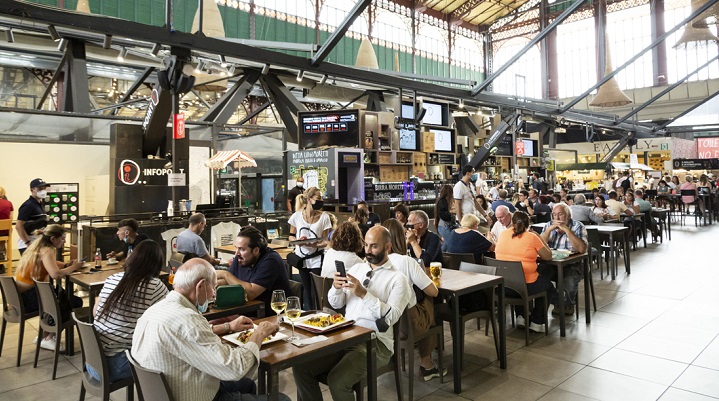Premium Italian food hall Mercato Centrale is set to open its first location outside of Italy with the launch of a new, 3000sqm grocery store and restaurant in Melbourne later this year. Occupying three floors in the historic McPherson’s Building at 546 Collins Street in the CBD, Mercato Centrale will offer gourmet groceries from over 20 artisans and makers, eat-in dining and a public space for people to meet, work and attend social and cultural events. There will be a butcher, fishmonge
hmonger and on-site bakery. The aim is to bring the best Italian food under one roof.
“If we do bread, it has to be the best. If we do pasta, it has to be the best. That’s the spirit of Mercato Centrale,” founder and chairman Umberto Montano told Inside Retail at a press event in Melbourne last week.
From Italy to Australia
Montano first opened Mercato Centrale in Florence in 2014, and since then, he has taken the concept to Rome, Turin and Milan. The four food halls in Italy collectively feature more than 100 artisans and receive more than 10 million visitors a year.
“We’ve never changed an artisan because everybody that comes into the system falls in love with the project; they don’t don’t want to change,” Montano said.
Mercato Centrale’s international expansion is the result of a partnership agreement with Australian hospitality entrepreneur Eddie Muto, of the Barman & Larder Group, who persuaded Montano that Melbourne would be a better destination than London or Paris.
“Melbourne is a city where people are into food and have a very broad understanding of a wide range of cuisines,” Muto told Inside Retail. “People love the joy that food brings to them.”
If it goes well, the pair plan to target Oceania and South Asia for further expansion.
A platform for artisans
Muto said he originally wanted to bring Eataly Down Under, but the brand wasn’t interested in the Australian market. Then he discovered Mercato Centrale.
“I was in Florence, and I googled Eataly, and it took me to Mercato Centrale because Eataly had a stall inside,” he said.
“Eataly puts itself out there as being the gurus of the food world; Mercato Centrale is actually quite different. It’s a platform for artisans to expose their art and skill to the greater community.”
Mercato Centrale covers the cost of building and running the food halls in exchange for a percentage of the artisans’ takings.
Strong demand for premium groceries
While many consumers are concerned about inflation and rising food prices, Australian retail expert Gary Mortimer believes there’s still a big market for premium groceries.
“Before Covid, we were spending about $65 billion a year on international travel, and we haven’t done that now for almost three years,” the QUT professor of marketing told Inside Retail.
“Despite international borders opening up, it’s still very difficult and risky to travel, so Australian consumers are actually in a better cash position than we’ve ever been before. People are choosing a premium offer.”
This can be seen in the rise of revenge shopping, where people treat themselves to designer fashion, expensive beauty treatments and even fancy food as a reward for enduring Covid.
“We’re not satisfied with a rump steak, we want an eye fillet, we want a 120-day-aged, grain-fed steak,” Mortimer said.
He noted that Locali, a chain of gourmet IGAs in Sydney, is doing “quite well”, as is James St Market, an upscale grocery store in Brisbane. But there have also been some high-profile failures.
“We had a Mercado open in Brisbane in 2018. It only lasted six months,” he said.
Foot traffic in CBDs still a problem
Location is a major success factor, with suburbs like Toorak in Melbourne and Vaucluse in Sydney the most logical outposts for a premium food offer.
Mercato Centrale’s positioning in the CBD could pose a problem. While the city of Melbourne expects foot traffic to return to pre-pandemic levels by the end of this year, when the food hall is slated to open, Mortimer isn’t fully convinced.
“You are exposed to office workers that may be spending two or three days a week working from home, and therefore there’s limited foot traffic going into that store,” he said.
However, Muto said the business isn’t “banking” on returning office workers, and that the food hall will appeal to everyone from kids who want an ice cream to grandmothers who want a cup of tea.
“We think Mercato Centrale has the ability to pull customers from all over the city, and we think it’ll reinvigorate the city,” he said. “It’s a great reason for you to come back.”

